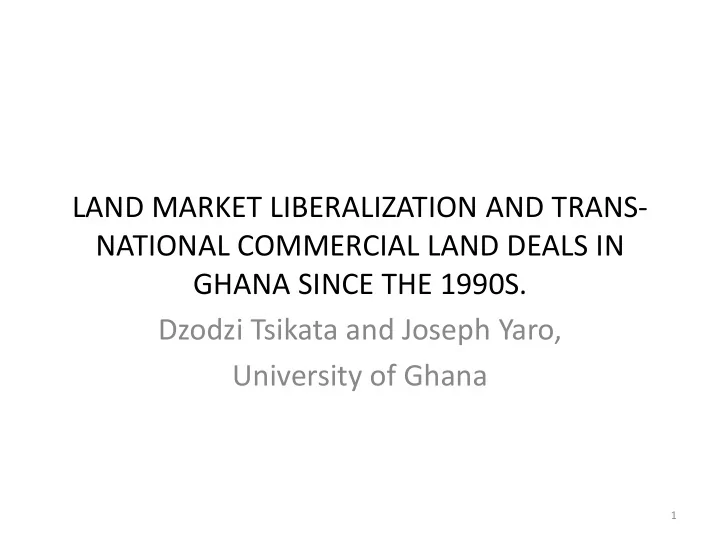

LAND MARKET LIBERALIZATION AND TRANS- NATIONAL COMMERCIAL LAND DEALS IN GHANA SINCE THE 1990S. Dzodzi Tsikata and Joseph Yaro, University of Ghana 1
Research Questions • Is the nature of particular transnational commercial land transactions a factor in how local communities respond to them? • Structure, business model, the role of different actors and mitigation measures • Are environmental characteristics and local rules of land tenure factors in how communities and their members are affected by transnational land transactions? • The sustainability of livelihoods and land tenure arrangements • Are there differences in impacts and responses within communities? • Social differentiation- land users; land interests; gender; poverty and migrant 2
The study areas and Methods • 3 Case studies – Prairie Volta Rice Ltd Project (Lower Volta, Volta Region – Biofuel Africa Ltd., Now Solar Harvest Ltd, Projects (Kpachaa Area, Northern Region) – Integrated Tamale Fruit Company (Dipaale Area, Northern Region) • Methods- qualitative – Interviews with project officials and chiefs – One male and one female focus group discussion – Individual interviews with 4 men and 4 women 3
4
Findings so far-Prairie Volta Rice Ltd Project • Long standing depression of Lower Volta; Area of outmigration • Company owned by American Texans, Ghana Government and Ghana commercial bank • Land holding system family based; however, Project land the subject of compulsory land acquisition, and now court dispute. • 1250 hectares acquired to cultivate rice largely for local market; Only 300 hectares under cultivation; additional 2,000 hectares in process of acquisition elsewhere in the area 5
Prairie continued • Much more land cleared but not in use- resulted in losses of usufruct in land; inconvenience of farming across a stream; and the loss of commons and bio-diversity. • Project business model does not involve communities except as employees (100 permanent staff); Community expectations centred on employment • 3 kinds of affected communities- land owning community- Mafi Dove; resettled pastoralists; and Bakpa Tademe- community with no land left. • Responses have included re-migration • Differences among the community- chiefs; members from land owning group- men/women; those not from land owning group; loss of commons have gendered impacts 6
Findings so Far- Kpachaa • Area of intensive farming and in migration • Land holding system chieftaincy based; acquisition from Dagbon overlord although sub-chiefs involved • 10,600 hectares acquired- majority Kpachaa village lands. 400 hectares- jatropha; 220 hectares maize. Another 500 hectares cleared for next season • Company began with jatropha; now shifting to maize • Business model involved farmers in the acquisition and gave options 7
Kpachaa-2 • Corporate social responsibility measures • Company employed community members until crisis • Disruption of local farming systems • Destruction of commons • Impacts gendered- shea nut; fuel wood losses • Responses have included out-migration; • Anti-project demonstration 8
Key issues and themes in the case studies • Nature of deals/contractual arrangements and Implications for Customary Systems of Land Tenure • Role of the state and local elite • Responses of Transnational companies to local conditions and changing global trends • The disappearing ‘commons’ • Food security 9
Some early conclusions • There are variations in the land transactions of transnational corporations in different land holding systems in Ghana. Outcomes have been remarkably similar for both food crops or non-food • crops. • Unfulfilled or partially fulfilled expectations and promises. • Benefits have been meagre, while their disadvantages have been significant from the point of view of local communities. • For the companies, returns have also been disappointing - unfavourable local conditions, but more importantly, the changing global trends. • The State as a player has compounded negative outcomes . • Institutional failures have occurred alongside conflicts of interest. Land deals impacts are not only economic, but are changing traditional • dynamics and arrangements of power and resource systems. • All these raise questions of agribusiness’s role in agrarian transformation. 10
Recommend
More recommend